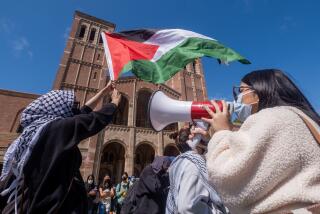<i> Intifada </i> and the Israeli Arab Vote : Defections From Labor to New Parties Will Test System
- Share via
The Palestinian uprising has triggered waves of solidarity among Arab citizens of Israel, who are likely to defect from mainstream Israeli parties in Tuesday’s elections. With a voting population capable of electing 14 or 15 members of the Knesset, Israeli Arabs will probably contribute only 3 or 4 to the mainstream parties; the rest of the vote will go to three mainly Arab parties, two of which are pariahs in Israeli politics.
Some Israelis call this trend the “Palestinianization” of Israeli Arabs, and they see it as dangerous. Thus the tendency will be to isolate the Arab-supported parties after the elections. This would be a mistake and a misunderstanding of political realities. Israeli Arabs are simply coming of age politically, not defecting from the Israeli political system. It is misleading to speak of the “Palestinianization” of Israeli Arabs; they are inherently no less Palestinian than American Jews are Jewish. On the other hand, no fundamental change has occurred in Israeli Arab loyalty to Israel as a result of the intifada. What has occurred is simply a narrowing of the range of political parties acceptable to Arabs.
Until the last Israeli elections, Israeli Arabs had no alternative to mainstream parties other than the Communist-led Democratic Front for Peace and Equality, which had been the only party advocating the establishment of a Palestinian state. Historically, this party has attracted one-third of the Arab vote, even though the communist ideology remains unacceptable to most Arabs. During the last election, the new non-Zionist Progressive List for Peace attracted an additional 17% of the Israeli Arab vote. The intifada will only marginally increase support for these two parties.
The biggest electoral change will be the defection of Israeli Arabs from the Labor Party. In this election, Labor will likely receive half of the 27% of Arab votes that it gained in the last election. Many defecting voters will probably support the new Arab Democratic Party headed by former Laborite Abdel-Wahhab Darawsheh.
Arab abandonment of Labor is partly related to the uprising. The harsh policies against the intifada are drawn by Defense Minister Yitzhak Rabin, a Labor leader. Some members of the coalition government responded to Israeli Arab protests not as the legitimate expressions of a segment of a democratic Israeli polity, but as the acts of ungrateful aliens whose welfare depends on the good will of the government. Labor members of the government did little to alter this view.
In the end, however, the intifada and the subsequent defection of Darawsheh from Labor have made it possible for Arab supporters to abandon Labor, as a number have wanted to do for some time. Labor has promised much before every election but delivered little; Israeli Arabs are still dramatically under-represented in Israeli institutions, Arab towns are noticeably less developed than Jewish towns, and Labor has not made the compromises on the Palestinian issue that most Arabs would like to see.
Many middle-class Arabs have not recovered from the early days (before 1966) when they were under military administration, and from the subsequent politics of patronage; they have maintained lingering fears that alienating Labor would undermine their economic and social positions. Darawsheh’s party and the psychological demands of the intifada opened new options.
Many Israelis do not appreciate these psychological demands. Israeli Arabs are both Israeli and Palestinian. Although their Israeli identity has intensified over time, full integration into the Israeli polity is prevented by the feeling, which reflects social and economic realities, that the “Jewishness” of Israel inevitably discriminates against them, and by the guilty feeling that full enjoyment of their Israeli citizenship can only be at the expense of Palestinians elsewhere. Full normalization cannot be attained, therefore, without a satisfactory settlement of the Palestinian-Israeli conflict, and more pain to other Palestinians will only highlight the tension attending Israeli Arab participation in mainstream Israeli parties.
In the past, the Labor Party represented the borderline of parties acceptable to Israeli Arabs. Since the uprising, this threshold has been raised to exclude Labor. Otherwise, life continues as normal, with economic welfare and civil rights being the primary concerns of Arab citizens. Even if a Palestinian state is established in the West Bank and Gaza, most Israeli Arabs would prefer to remain citizens of Israel, given full rights of citizenship.
As the outcome of Tuesday’s voting unfolds, the three largely Arab parties, electing perhaps 10 Knesset deputies, may be isolated in Israeli politics. That would be tragic for those who support territorial compromise for peace. Projections are that, in the absence of Arab support, Labor will be unable to form a government without a coalition with right-wing parties, if at all. Such a government would be unable to make the fateful decisions facing Israel.
Labor would be wise to consider negotiating the support of all three Arab-supported parties after the election instead of ignoring or excluding Israeli Arabs from the political system. The minimal gestures (on civil rights and the Palestinian issue) necessary for attaining Israeli Arabs’ support are mirror images of those required for the eventual normalization of the state of Israel in its Arab environment. As Israel’s first president, Chaim Weizman, once remarked, how Israel treats its Arab minority will ultimately affect its future in the Middle East.
More to Read
Sign up for Essential California
The most important California stories and recommendations in your inbox every morning.
You may occasionally receive promotional content from the Los Angeles Times.













